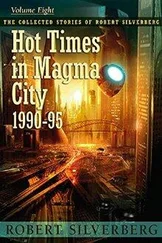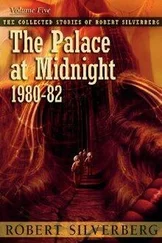Robert Silverberg - How it Was When the Past Went Away
Здесь есть возможность читать онлайн «Robert Silverberg - How it Was When the Past Went Away» весь текст электронной книги совершенно бесплатно (целиком полную версию без сокращений). В некоторых случаях можно слушать аудио, скачать через торрент в формате fb2 и присутствует краткое содержание. Год выпуска: 2007, ISBN: 2007, Издательство: Subterranean Press, Жанр: Фантастика и фэнтези, на английском языке. Описание произведения, (предисловие) а так же отзывы посетителей доступны на портале библиотеки ЛибКат.
- Название:How it Was When the Past Went Away
- Автор:
- Издательство:Subterranean Press
- Жанр:
- Год:2007
- ISBN:978-1-59606-089-0
- Рейтинг книги:4 / 5. Голосов: 1
-
Избранное:Добавить в избранное
- Отзывы:
-
Ваша оценка:
- 80
- 1
- 2
- 3
- 4
- 5
How it Was When the Past Went Away: краткое содержание, описание и аннотация
Предлагаем к чтению аннотацию, описание, краткое содержание или предисловие (зависит от того, что написал сам автор книги «How it Was When the Past Went Away»). Если вы не нашли необходимую информацию о книге — напишите в комментариях, мы постараемся отыскать её.
How it Was When the Past Went Away — читать онлайн бесплатно полную книгу (весь текст) целиком
Ниже представлен текст книги, разбитый по страницам. Система сохранения места последней прочитанной страницы, позволяет с удобством читать онлайн бесплатно книгу «How it Was When the Past Went Away», без необходимости каждый раз заново искать на чём Вы остановились. Поставьте закладку, и сможете в любой момент перейти на страницу, на которой закончили чтение.
Интервал:
Закладка:
It was so good to be working again that Mueller didn’t want to stop. By early afternoon on Saturday his studio was ready; he had long since worked out the sketches of the first piece; now it was just a matter of time and effort, and he’d have something to show Pete Castine. He worked on far into the evening, setting up his armature and running a few tests of the sound sequences that he proposed to build into the piece. He had some interesting new ideas about the sonic triggers, the devices that would set off the sound effects when the appreciator came within range. Carole had to tell him, finally, that dinner was ready. “I didn’t want to interrupt you,” she said, “but it looks like I have to, or you won’t ever stop.”
“Sorry. The creative ecstasy.”
“Save some of that energy. There are other ecstasies. The ecstasy of dinner, first.”
She had cooked everything herself. Beautiful. He went back to work again afterward, but at half past one in the morning Carole interrupted him. He was willing to stop, now. He had done an honest day’s work, and he was sweaty with the noble sweat of a job well done. Two minutes under the molecular cleanser and the sweat was gone, but the good ache of virtuous fatigue remained. He hadn’t felt this way in years.
He woke to Sunday thoughts of unpaid debts.
“The robots are still there,” he said. “They won’t go away, will they? Even though the whole city’s at a standstill, nobody’s told the robots to quit.”
“Ignore them,” Carole said.
“That’s what I’ve been doing. But I can’t ignore the debts. Ultimately there’ll be a reckoning.”
“You’re working again, though! You’ll have an income coming in.”
“Do you know what I owe?” he asked. “Almost a million. If I produced one piece a week for a year, and sold each piece for twenty bigs, I might pay everything off. But I can’t work that fast, and the market can’t possibly absorb that many Muellers, and Pete certainly can’t buy them all for future sale.”
He noticed the way Carole’s face darkened at the mention of Pete Castine.
He said, “You know what I’ll have to do? Go to Caracas, like I was planning before this memory thing started. I can work there, and ship my stuff to Pete. And maybe in two or three years I’ll have paid off my debt, a hundred cents on the dollar, and I can start fresh back here. Do you know if that’s possible? I mean, if you jump to a debtor sanctuary, are you blackballed for credit forever, even if you pay off what you owe?”
“I don’t know,” Carole said distantly.
“I’ll find that out later. The important thing is that I’m working again, and I’ve got to go someplace where I can work without being hounded. And then I’ll pay everybody off. You’ll come with me to Caracas, won’t you?”
“Maybe we won’t have to go,” Carole said.
“But how—”
“You should be working now, shouldn’t you?”
He worked, and while he worked he made lists of creditors in his mind, dreaming of the day when every name on every list was crossed off. When he got hungry he emerged from the studio and found Carole sitting gloomily in the living room. Her eyes were red and puffy-lidded.
“What’s wrong?” he asked. “You don’t want to go to Caracas?”
“Please, Paul—let’s not talk about it—”
“I’ve really got no alternative. I mean, unless we pick one of the other sanctuaries. Sao Paulo? Spalato?”
“It isn’t that, Paul.”
“What, then?”
“I’m starting to remember again.”
The air went out of him. “Oh,” he said.
“I remember November, December, January. The crazy things you were doing, the loans, the financial juggling. And the quarrels we had. They were terrible quarrels.”
“Oh.”
“The divorce. I remember, Paul. It started coming back last night, but you were so happy I didn’t want to say anything. And this morning it’s much clearer. You still don’t remember any of it?”
“Not a thing past last October.”
“I do,” she said, shakily. “You hit me, do you know that? You cut my lip. You slammed me against the wall, right over there, and then you threw the Chinese vase at me and it broke.”
“Oh. Oh.”
She went on, “I remember how good Pete was to me, too. I think I can almost remember marrying him, being his wife. Paul, I’m scared. I feel everything fitting into place in my mind, and it’s as scary as if my mind was breaking into pieces. It was so good, Paul, these last few days. It was like being a newlywed with you again. But now all the sour parts are coming back, the hate, the ugliness, it’s all alive for me again. And I feel so bad about Pete. The two of us, Friday, shutting him out. He was a real gentleman about it. But the fact is that he saved me when I was going under, and I owe him something for that.”
“What do you plan to do?” he asked quietly.
“I think I ought to go back to him. I’m his wife. I’ve got no right to stay here.”
“But I’m not the same man you came to hate,” Mueller protested. “I’m the old Paul; the one from last year and before. The man you loved. All the hateful stuff is gone from me.”
“Not from me, though. Not now.”
They were both silent.
“I think I should go back, Paul.”
“Whatever you say.”
“I think I should. I wish you all kinds of luck, but I can’t stay here. Will it hurt your work if I leave again?”
“I won’t know until you do.”
She told him three or four times that she felt she ought to go back to Castine, and then, politely, he suggested that she should go back right now, if that was how she felt, and she did. He spent half an hour wandering around the apartment, which seemed so awfully empty again. He nearly invited one of the dunning robots in for company. Instead, he went back to work. To his surprise, he worked quite well, and in an hour he had ceased thinking about Carole entirely.
Sunday afternoon, Freddy Munson set up a credit transfer and managed to get most of his liquid assets fed into an old account he kept at the Bank of Luna. Toward evening, he went down to the wharf and boarded a three-man hovercraft owned by a fisherman willing to take his chances with the law. They slipped out into the bay without running lights and crossed the bay on a big diagonal, landing some time later a few miles north of Berkeley. Munson found a cab to take him to the Oakland airport, and caught the midnight shuttle to LA, where, after a lot of fancy talking, he was able to buy his way aboard the next Luna-bound rocket, lifting off at ten o’clock Monday morning. He spent the night in the spaceport terminal. He had taken with him nothing except the clothes he wore; his fine possessions, his paintings, his suits, his Mueller sculptures, and all the rest remained in his apartment, and ultimately would be sold to satisfy the judgments against him. Too bad. He knew that he wouldn’t be coming back to Earth again, either, not with a larceny warrant or worse awaiting him. Also too bad. It had been so nice for so long, here, and who needed a memory drug in the water supply? Munson had only one consolation. It was an article of his philosophy that sooner or later, no matter how neatly you organized your life, fate opened a trapdoor underneath your feet and catapulted you into something unknown and unpleasant. Now he knew that it was true even for him.
Too, too bad. He wondered what his chances were of starting over up there. Did they need stockbrokers on the moon?
Addressing the citizenry on Monday night, Commander Braskett said, “The committee of public safety is pleased to report that we have come through the worst part of the crisis. As many of you have already discovered, memories are beginning to return. The process of recovery will be more swift for some than others, but great progress has been made. Effective at six A.M. tomorrow, access routes to and from San Francisco will reopen. There will be normal mail services and many businesses will return to normal. Fellow citizens, we have demonstrated once again the real fiber of the American spirit. The founding fathers must be smiling down upon us today! How superbly we avoided chaos, and how beautifully we pulled together to help one another in what could have been an hour of turmoil and despair!
Читать дальшеИнтервал:
Закладка:
Похожие книги на «How it Was When the Past Went Away»
Представляем Вашему вниманию похожие книги на «How it Was When the Past Went Away» списком для выбора. Мы отобрали схожую по названию и смыслу литературу в надежде предоставить читателям больше вариантов отыскать новые, интересные, ещё непрочитанные произведения.
Обсуждение, отзывы о книге «How it Was When the Past Went Away» и просто собственные мнения читателей. Оставьте ваши комментарии, напишите, что Вы думаете о произведении, его смысле или главных героях. Укажите что конкретно понравилось, а что нет, и почему Вы так считаете.












